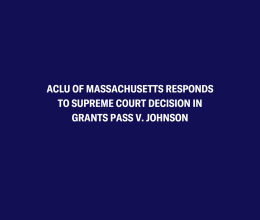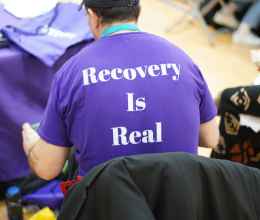
Massachusetts imprisonment of people suffering from addiction must end
By Matthew Segal and Jessie Rossman
The Massachusetts civil commitment statute, known as “Section 35,” makes it the nation’s only state that imprisons people suffering from addiction who have not been convicted of a crime. Worse yet, women imprisoned under Section 35 are sent to MCI-Framingham, where addiction treatment is offered only to convicted prisoners; women merely “civilly” committed receive none. That’s why three groups—Prisoners’ Legal Services, the Center for Public Representation and the ACLU of Massachusetts—joined with the law firm WilmerHale in June 2014 to file a federal class-action suit challenging the imprisonment of Massachusetts women who are civilly committed for addiction.
Today, Massachusetts public officials announced that they share with us the goal of ending this practice. At a press conference on Governor Charlie Baker’s proposed legislation concerning opiate addiction, Secretary Marylou Sudders of the Executive Office of Health and Human Services, in discussing one aspect of the proposal, acknowledged that public officials have been pledging since 1987 to eliminate MCI-Framingham as a place where civilly committed women are sent. She pledged that the Baker administration will do it once and for all.
That is good news, but it is not enough especially in light of the overwhelming role of criminal justice in this proposal that is supposed to be dealing with a public health crisis.
For starters, proposed legislation is just that—a proposal. And in the specific area of women being incarcerated for an addiction, we do not know whether any legislation will pass. And we certainly don’t know whether legislation that does pass will in fact eliminate MCI-Framingham as a place that houses—but, again, does not treat—women suffering from addiction. Precisely because public officials have been making pledges on this issue since 1987, as Secretary Sudders noted, we need to see concrete change and not just good ideas.
But even if it were certain that legislation would pass in the future, that would do nothing for the women who are and will be imprisoned at MCI-Framingham in the meantime. Although more than 15 months have passed since we sued, civilly committed women are still being imprisoned without treatment. Just last month, there were 23 to 29 of these women—our clients—at MCI-Framingham every day.
These women have not been convicted of any crime.
They are not receiving treatment.
And they are in prison right now.
The Governor pointed out today that the opiate addiction is in many ways about pain. Pain drives people to seek medication, which in turn can lead to the pain and suffering of addiction. As the Governor said, some pain is acute and some is chronic.
For civilly committed women imprisoned at MCI-Framingham, their pain has been both acute and chronic. They suffer the acute pain of being imprisoned without treatment because they suffer from a disease. And, in the aggregate, they have suffered this pain chronically for nearly three decades, while public officials failed to solve the problem. And perhaps worst of all, this pain has been inflicted upon them by their own government.
We welcome the news that the Baker administration agrees with us that this practice must stop. But it needs to stop immediately, and for good. We will not rest until it does.
Matt Segal is the legal director and Jessie Rossman is a staff attorney at the ACLU of Massachusetts.
Related content


ACLU of Massachusetts responds to Supreme Court decision in Grants...
June 28, 2024
Massachusetts for Overdose Prevention Centers comment on new VT law...
June 18, 2024
Labor unions in Massachusetts join MA4OPC Coalition to support...
April 4, 2024
ACLU of Massachusetts comment on Governor’s Council approval of...
April 3, 2024
ACLU of Massachusetts v. Bristol District Attorney’s Office
March 26, 2024
Supreme Judicial Court rules that Hampden DA withheld exculpatory...
January 23, 2024
New study: Massachusetts officials recognize overdose prevention...
December 13, 2023